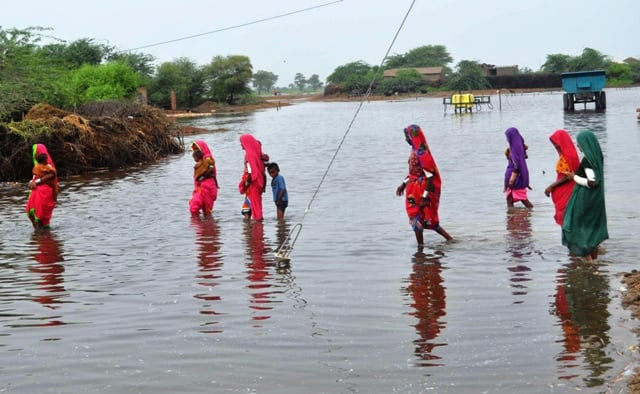More than one million affected by floods in Sindh
99% of all crop in Badin has been completely destroyed by the floods, Edhi visits flood-hit areas.

Thousands of people are stranded in the lower districts of Sindh, where rains have triggered devastating floods.
Express 24/7 correspondent Shaheryar Mirza reported that 99% of all crop in Badin has been completely destroyed by the floods. He added that search and rescue operations in the area are underway and according to Navy officials, about 500 people have been rescued. Some families in the area, however, are yet to be rescued.
Mirza reported that rescue efforts over the last six days have been concentrated on Badin, whereas Tando Mohammad Khan, Mirpur Khas and Thatta have also been affected.
Workers at relief centres in these areas said they do not have enough resources to provide adequate aid to the displaced and affected persons. They added that they are trying to contain the spread of skin disease and diarrhea, that have occurred in the aftermath of the floods.
On Thursday, National Assembly Speaker Fehmida Mirza candidly acknowledged the lack of facilities such as food, water, health and hygiene at camps. “There are many more (IDPs) living under the open sky on roads. The district government doesn’t have the resources to fend for itself.”
She held the national and provincial disaster management authorities responsible. “They have failed to take up their responsibility,” she said vehemently.
Edhi visits flood-hit Sindh
Renowned social worker and Founder of Edhi Foundation Abdur Sattar Edhi paid a visit to the rain-ravaged areas of district Badin and Tando Muhammad Khan on Thursday.
Talking to media, he said that the people of the rural areas were worst affected by the devastation caused by the recent torrential rains.
He said that the aid so far provided to the victims was from citizens and not from the government. He said that Pakistan is rich in natural resources, but needs honest leadership to use these resources.
He said that the elimination of corruption would open doors for a genuine development in the country.
He also announced to provide an extra ambulance for the Edhi Centre of Matli



















COMMENTS
Comments are moderated and generally will be posted if they are on-topic and not abusive.
For more information, please see our Comments FAQ